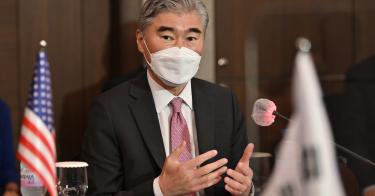Pyongyang has dashed the hopes of experts who had interpreted Kim Jong Un’s “dialogue or confrontation” statement last week as portending a return to negotiations. Two senior North Korean officials dismissed speculation that the regime was interested in dialogue, though atypically they refrained from adding threats of impending provocation.
Pyongyang may eventually ratchet up tensions designed to garner concessions from the United States. For now, however, the regime seems focused on addressing dire domestic economic conditions and food shortages.
On June 17, Kim said North Korea should be “prepared for both dialogue and confrontation, especially to get fully prepared for confrontation.” The omission of his usual demand that the United States abandon its “hostile policy” led some to assess that the regime had softened its approach to Washington.
U.S. National Security Advisor Jake Sullivan cautiously characterized Kim’s statement as an “interesting signal,” but said the administration was looking for clearer signs of the regime’s willingness to return to dialogue. Meanwhile, U.S. Special Envoy for North Korea Sung Kim declared that Washington was willing to “meet anywhere, anytime without preconditions.”
Kim Yo Jong, the North Korean leader’s powerful sister, responded by ridiculing Sullivan’s interpretation as wishful thinking that would only “plunge them into a greater disappointment.” To drive home the point, Ri Son Gwon, North Korea’s minister of foreign affairs, declared that the regime was “not considering even the possibility of any contact with the U.S….which would get us nowhere, only taking up precious time.”
Since the collapse of the U.S.-North Korean summit in 2019, Pyongyang has been dismissive of dialogue. Following the working-level meetings in October 2019, Pyongyang declared it had “no intention to hold such ‘sickening negotiations’” unless the United States substantially altered its policy. In March 2021, First Vice Foreign Minister Choe Son Hui announced the regime would have “no contact or dialogue of any kind” with the Biden administration and dismissed U.S. calls for complete denuclearization as “groundless rhetoric.”
Last year, Kim Yong Jong urged the U.S. to abandon the “pipedream” of getting Pyongyang to agree to the permanent dismantlement of its Yongbyon nuclear facility in exchange for partial lifting of sanctions. If Washington wanted a resumption of bilateral negotiations, she said, it would have to put much more significant concessions on the table than it did in the Hanoi summit.
In January 2021, Kim Jong Un indicated that the change in U.S. administrations would not lead to any improvement in bilateral relations. “No matter who is in power,” he said, “the U.S. itself and its hostile policy toward North Korea will never change.”
To establish North Korean-U.S. relations, Kim asserted, Washington must first abandon its “hostile policy.” Pyongyang defines this as: abrogating the U.S.-South Korean alliance, removing all U.S. forces from the region, ending all international sanctions and ceasing any criticism of the regime.
The path to dialogue with North Korea often first runs through an escalation of tensions and subsequent regime offers to return to the status quo ante…for a price. Early in a new U.S. or South Korean administration, Pyongyang typically conducts a major provocative action—such as a nuclear or long-range missile test—because the regime believes it gives them leverage.
North Korea has no shortage of new missiles that it could test launch. It has unveiled several new systems in recent parades, including a massive intercontinental ballistic missile that may have multiple nuclear warheads and two submarine-launched ballistic missiles. Such actions would plunge the Korean Peninsula back into a sense of crisis and necessitate international responses that could precipitate follow-on regime actions.
The ongoing stalemate and potential for crisis has led some experts to urge the U.S. to abandon its demands that North Korea comply with 11 United Nations resolutions requiring the regime to denuclearize. Additionally, the Moon Jae-in administration in South Korea (and others) has called for reducing UN and U.S. sanctions or providing additional benefits and concessions to get Pyongyang back to the negotiating table.
The Biden administration—in conjunction with the G7 nations, NATO and allies South Korea and Japan—has correctly affirmed the necessity of maintaining denuclearization as an end goal, though implemented incrementally and in return for negotiated reciprocal measures.
Washington should continue affirming its desire for dialogue and negotiations. Pyongyang’s repeated refusals even for diplomatic contact merely confirm that it remains the impediment to a diplomatic resolution of the long-standing nuclear issue.
In the meantime, the Biden administration must take steps to uphold allied deterrence and defense capabilities, including resumption of military exercises on the Korean Peninsula when COVID-19 conditions allow. Washington should also implement long-stalled sanctions against North Korean, Chinese and other nations’ entities violating U.S. laws and U.N. resolutions.
Dialogue and deterrence are not mutually exclusive.
This piece originally appeared in The Hill on 6/25/2021



